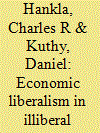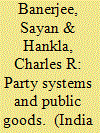| Srl | Item |
| 1 |
ID:
123620


|
|
|
|
|
| Publication |
2013.
|
| Summary/Abstract |
Over the last few decades, a vast literature has emerged examining the relationship between democratic political institutions and trade policy outcomes. While this literature has added significantly to our knowledge, it has effectively ignored policymaking in dozens of important states-those that remain autocratic. This paper fills that hole by exploring the effects of authoritarian variation on national trade policies. Our contention is that more institutionalized authoritarian regimes will tend to adopt more open trade policies. This relationship should hold, we argue, for two distinct reasons. First, we argue that autocratic regimes with larger "selectorates" should have greater incentives to provide public rather than private goods. As a result, we expect that multiparty, and to a lesser extent single-party, autocracies will tend to prefer more open trade policies than non-party (often personalistic) dictatorships, monarchies, and military juntas. Second, we contend that more stable autocratic regimes will have longer time horizons and therefore greater incentives to adopt policies, such as trade openness, that may strengthen long-run economic performance. We find strong support for these arguments using several cross-national time-series models of all autocracies ranging from 1962 to 2007 (contingent on data availability).
|
|
|
|
|
|
|
|
|
|
|
|
|
|
|
|
| 2 |
ID:
178072


|
|
|
|
|
| Summary/Abstract |
We argue that two key party system characteristics – the effective number of parties and electoral volatility – have a curvilinear, inverted-U shaped, influence on public goods provision. Rejecting the linear pattern generally assumed in the literature, we contend that optimal governance outcomes will be observed at intermediate levels of party system size and stability. Only under these conditions will the benefits of competition be balanced against the risks of fragmentation. We find support for our arguments by employing new data and estimating panel models of public goods provision in 29 Indian states and territories. We hope that our findings will contribute to understanding how party systems function, particularly those at the subnational level, and will better inform how they can be leveraged for development and good governance. We also hope that they will provide some guidance about the future trajectory of public policy in the Indian states.
|
|
|
|
|
|
|
|
|
|
|
|
|
|
|
|